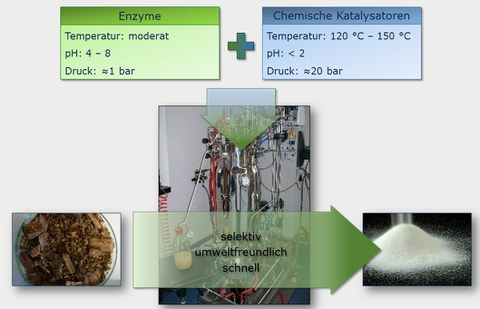CrossCat: Symbiose von biologischen & chemischen Katalysatoren zur nachhaltigen Umwandlung von Hemicellulosen
Die steigende Notwendigkeit der Nutzung nachwachsender Rohstoffe erfordert den Einsatz modernster verfahrenstechnischer Methoden. Die Abhängigkeit der Chemieindustrie, und damit der Gesellschaft, von fossilen Rohstoffen, wie Erdöl und Erdgas, kann erst durch eine breite wissenschaftlich fundierte und technische funktionale Bioraffinerie-Infrastruktur abgelöst werden. Die Hemicellulose ist mit einem Masseanteil von bis zu 35 % der zweitgrößte Bestandteil von Lignocellulosen, aber bezüglich ihrer nachhaltigen Verwertung aufgrund des heterogenen Aufbaus im Vergleich zur Cellulose und Lignin wenig untersucht. Sie lässt sich effizient aus „non-food“ Biomasse gewinnen, zum Beispiel aus Reststoffströmen aus der Agrar-, Forst- und Holzwirtschaft oder aus der Papiertechnik, und steht somit nicht in Konkurrenz mit der Nahrungssicherung und trägt zusätzlich zur Erweiterung der Wertschöpfungskette der betreffenden Reststoffströme bei. Basierend auf den Monomeren der Hemicellulose existieren ein Vielzahl interessanter Produkte, deren nachhaltige Produktion zunehmend entwicklet und optimiert werden muss. Teure Chemikalien und Katalysatoren, sowie die Notwendigkeit von hohen Temperaturen und extremen pH-Werten, sind charakteristisch für conventionelle Prozesse. Alternative biotechnologische Methoden für eine wissensbasierte bio-ökonomische Prozessgestaltung sind daher von elementarer Bedeutung.
Das Ziel des vorgestellten Projekts ist die Entwicklung eines innovativen Hybridprozess für die Produktion von Plattformchemikalien, wie Zucker und Polyole, für die Lebensmittelindustrie, Pharmazie und Kosmetikindustrie durch die Kombination verschiedener Katalysatoren und ihrer Vorteile. Die Besonderheit hierbei ist die simultane Nutzung biologischer (Enzyme und thermophiler Organismen) und chemischer Katalysatoren in einem Reaktor ermöglicht durch die Anpassung des Temperatur- und pH-Regimes, sowie den Einsatz verschiedener Immobilisierungs- und wenn notwendig Kompartimentierungsstrategien. Durch dieses Konzept werden die Vorteile der chemokatalytischen Reaktion mit denen der weißen Biotechnologie verbunden. Sowohl die ökonomische Effizienz als auch die ökologische Nachhaltigkeit des Prozesses sollen durch die Reduzierung von Prozesszeit, Energieeintrag und Ressourceneinsatz deutlich gesteigert werden. Komplexe und aufwendige Zwischenschritte, wie Speparation, Aufkonzentrierung, Aufreinigung und Neutralisierungsprozesse werden reduziert, sowie unspezifische Reaktion, Inhibierungsprozesse und der Wasser- und Energieverbrauch minimiert.
Die Umwandlung von Hemicellulose zu Einfachzuckern und Zuckeralkoholen soll am Beispiel der Aufspaltung und Veredelung von (Glucurono)Xylan zu Xylose und Xylitol untersucht werden und eine neue Grundlage für die Produktion weiterer auf Hemicellulose basierender Produkte bilden. Dieser neue Prozess zeichnet sich zusätzlich durch seinen Plattformcharakter aus, so können verschiedene lignocellulosehaltige Ausgangmaterialien ohne regionale Diskriminierungen genutzt und zukünftig auch weitere Produkte, wie Ethylenglycol, Itaconsäure oder 1,2-Isopropandiol, durch die Variation der Katalysatoren produziert werden.
Weitere Informationen finden sie auf der CrossCat-Homepage: http://www.crosscat.eu/
Projektfinanzierung
Förderkennzeichen: 100271549 Verbundprojekt aus ERA-IB-Ausschreibung
Projektleiter:
 © Christian Hüller
© Christian Hüller
Seniorprofessor für Bioverfahrenstechnik
NameProf. Dr. rer. nat. habil. Thomas Bley
Eine verschlüsselte E-Mail über das SecureMail-Portal versenden (nur für TUD-externe Personen).
Projektmitarbeiter:
 © Mann
© Mann
Wissenschaftliche Mitarbeiterin
NameDr.-Ing. Susanne Steudler
Gewinnung technischer Enzyme durch Feststofffermentation
Eine verschlüsselte E-Mail über das SecureMail-Portal versenden (nur für TUD-externe Personen).
Kooperationspartner :
TU Dresden
Fakultät Maschinenwesen
Professur für Chemische Verfahrens- und Anlagentechnik
Prof. Dr.-Ing. habil. Rüdiger Lange
http://www.cvt.tu-dresden.de
EXPUTEC GmbH
Pfeilgasse 32/20, A-1080 Wien, Österreich
Dr. Patrick Sagmeister
http://exputec.com/
Åbo Akademi University
Department of Chemical Engineering
Laboratory of Industrial Chemistry and Reaction Engineering
Biskopsgatan 8, 20500, Turku/Åbo, Finland
Prof. Dr. Tapio Salmi
https://www.abo.fi/fakultet/en/tekniskkemi
Projektlaufzeit:
01.04.2016 -31.03.2019

